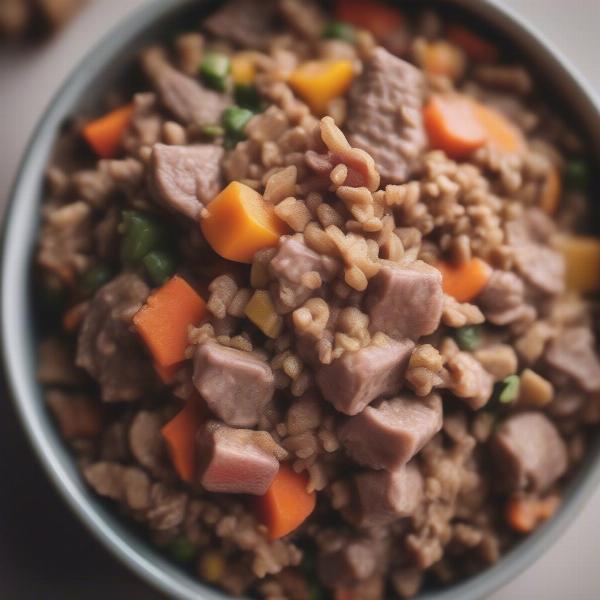Choosing the right protein source for your dog can feel like navigating a maze. You want what’s best for their health, but with so many options available, it’s hard to know where to start. Is lamb or salmon better for dogs? This article dives deep into the nutritional benefits of both, helping you make an informed decision for your furry friend.
Understanding Your Dog’s Nutritional Needs
Before we compare lamb and salmon, let’s quickly review the basics of canine nutrition. Dogs require a balanced diet that includes protein, fats, carbohydrates, vitamins, and minerals. Protein is crucial for building and repairing tissues, supporting immune function, and providing energy. Both lamb and salmon are excellent sources of protein, but they offer different nutritional profiles.
Lamb: A Red Meat Powerhouse
Lamb is a rich source of high-quality protein, containing all the essential amino acids dogs need. It’s also packed with vitamins and minerals like iron, zinc, and vitamin B12, which contribute to healthy blood, skin, and coat. Lamb is often a good choice for dogs with allergies to more common protein sources like chicken or beef.
Benefits of Lamb for Dogs
- Highly digestible: Lamb is generally easier for dogs to digest than other red meats.
- Great for sensitive stomachs: This makes it a suitable option for dogs with digestive issues.
- Rich in iron and B vitamins: Supports energy levels and overall well-being.
 Lamb Dog Food
Lamb Dog Food
Salmon: An Omega-3 Superstar
Salmon is a powerhouse of omega-3 fatty acids, particularly EPA and DHA. These essential fatty acids offer numerous benefits, including reducing inflammation, promoting healthy skin and coat, supporting cognitive function, and boosting the immune system. Salmon is also a good source of protein and other essential nutrients.
Benefits of Salmon for Dogs
- Rich in Omega-3s: Supports skin and coat health, reduces inflammation, and improves brain function.
- Highly palatable: Many dogs love the taste of salmon.
- Good source of Vitamin D: Important for bone health.
Lamb vs. Salmon: Which is Right for Your Dog?
The best choice between lamb and salmon depends on your individual dog’s needs and preferences.
For Allergies:
If your dog has food sensitivities, lamb is often a better option as it’s less common allergen than fish.
For Skin and Coat Health:
Salmon, with its high omega-3 content, can be beneficial for dogs with skin and coat issues.
For Picky Eaters:
The strong aroma and flavor of salmon can tempt even the fussiest eaters.
Making the Switch: Introducing New Foods
When introducing a new protein source, do so gradually to avoid upsetting your dog’s stomach. Start by mixing a small amount of the new food with their current food and gradually increase the proportion over several days.
Conclusion: A Balanced Approach
Both lamb and salmon offer unique nutritional benefits for dogs. Incorporating both into their diet, as part of a balanced and varied approach, can provide a wide range of nutrients and support their overall health. Consult with your veterinarian to determine the best feeding plan for your dog, considering their age, breed, activity level, and any specific health concerns. Remember to choose high-quality dog food that lists lamb or salmon as a primary ingredient.
FAQ:
- Can I feed my dog lamb and salmon every day? While both are healthy, it’s best to offer variety. Consult with your vet for a tailored feeding plan.
- Is raw salmon safe for dogs? Raw salmon can contain parasites, so it’s generally recommended to cook it before feeding it to your dog.
- What are the signs of a food allergy in dogs? Common signs include itching, skin rashes, digestive upset, and ear infections.
- Can puppies eat lamb and salmon? Yes, both can be introduced to puppies as part of a balanced diet. Consult your vet for guidance.
- Are there any risks associated with feeding lamb or salmon to dogs? Some dogs may have sensitivities or allergies to either protein source. Always introduce new foods gradually.
- How do I choose a good quality lamb or salmon dog food? Look for foods that list lamb or salmon as a primary ingredient and avoid products with fillers and artificial additives.
- What other protein sources are good for dogs? Chicken, beef, turkey, and duck are also good options.
Related Articles on ILM Dog:
ILM Dog is your trusted global resource for all things dog-related. We provide expert advice and practical tips on dog breeds, health, training, nutrition, grooming, and much more. From puppy care to senior dog support, we offer a wealth of knowledge to help you provide the best possible care for your canine companion. We are passionate about helping dog owners worldwide understand their pets’ needs and create a happy and fulfilling life together. For more information or personalized advice, connect with us via email at [email protected] or call us at +44 20-3965-8624. ILM Dog is here to support you and your furry friend every step of the way.